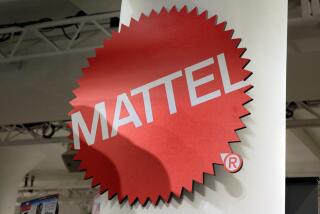In Second Effort to Buy Robins, Rorer Offers $725 Million
- Share via
NEW YORK — A. H. Robins Co., the health-care maker mired in bankruptcy proceedings brought on by its Dalkon Shield contraceptive, said Friday that it received a stock-swap merger proposal from the Rorer Group drug company valued at a minimum of $725 million.
It was the second merger offer by Rorer in four months, but analysts said the family-owned Robins’ fierce desire to remain independent appeared to give this offer no better chance of succeeding than the first failed attempt.
“Basically things haven’t changed,” said analyst David Saks of L. F. Rothschild, Unterberg, Towbin Inc. “Rorer is adamant to try and get Robins, and Robins is adamant not to be taken over.”
Rorer, which sells prescription and over-the-counter drugs and hospital products worldwide, is best known as the maker of Maalox, an antacid.
Its offer for Robins, which sells such popular name brands as Robitussin cough medicine, Chap Stick and Dimetapp cold remedy, is set to expire Monday. Rorer’s previous offer in March was also short-lived, lasting a scant 48 hours, a strategy summed up by one Rorer employee as “they either want us or they don’t.”
The Richmond-based Robins filed for bankruptcy protection in August, 1985, to escape numerous lawsuits from women who had used its Dalkon Shield interuterine device and suffered serious maladies.
The latest merger proposal from Fort Washington, Pa.-based Rorer provides for two trusts totaling $1.75 billion, Robins said, the same amount provided by Robins for Dalkon-related claims when it filed a $1.85-billion reorganization plan last month.
About 3.3 million Dalkon shields were sold by Robins in more than 80 countries between 1971 and 1974, including 2.2 million in the United States before it was withdrawn from the market.
Because of the legal problems, Saks said, the decision to merge may not lie solely in the hands of the company. The legal players could exert a strong influence, prompting a decision on whether a merger would be a more expedient way of dealing with the company’s liabilities.
The Rorer proposal would exchange either one share of Rorer’s convertible stock worth an estimated $30 a share for each share of Robins’ stock, or 0.65 of a share of Rorer common stock for each Robins share, depending on which price is greater. At Friday’s closing price for Rorer stock of $45.50, the deal would be worth an estimated $724.8 million.
“This could be a bargain,” said analyst Craig Dickson of Interstate Securities Corp. “But the key issue remains how to deal with the liabilities.”
Dickson said that using a normal three-times-revenues valuation for Robins, its stock, which closed up $1.50 to $26.50 on Friday, is worth roughly $100 a share.
“They must know something if they are willing to go a second time around for Robins,” Dickson added.
“Robins is a handyman’s special,” said analyst Saks. “Structured the right way it could be a fantastic bargain, but it could also be a big headache.”
A Rorer spokeswoman said a combination of the two companies would create the nation’s sixth-largest over-the-counter drug company and eighth-largest drug company, based on hospital sales.
“All good things come from (economies of) scale,” she said, adding that Rorer has embarked on an ambitious expansion program to become one of the top 10 to 15 pharmaceutical companies in the world.
Last year, Rorer revenue soared to $844 million from $388 million in 1985, following its $690-million purchase of Revlon Group’s Healthcare companies.
In 1986, Robins earned $82 million on revenue of $790 million.
More to Read
Inside the business of entertainment
The Wide Shot brings you news, analysis and insights on everything from streaming wars to production — and what it all means for the future.
You may occasionally receive promotional content from the Los Angeles Times.










